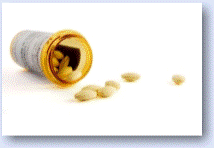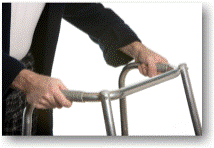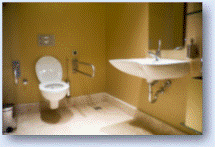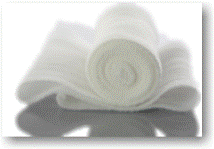| |
Day by Day Progress
Page Content The following section provides a day by day look at the care you will receive starting with your day of surgery until you are discharged home.
Click on the tabs below to view your expected progress for each day.
Article Content One
 |
Diet
- An intravenous (IV) is started for fluids and medications.
- You will start with liquids, or a light meal as tolerated.
|
 |
Medication
- You will have a Pain Controlled Analgesic (PCA) pump, or pain medicine by needles or mouth, to make sure that you are comfortable.
- Nurse may give you an injection or pill to help prevent blood clots.
- Oxygen if needed.
- Antibiotics will be given through IV to help prevent
|
 |
Activities and Exercises
- You will get out of bed with the help of a physiotherapist and/or nurse, generally within 24 hours of your surgery.
- You will do deep breathing and coughing exercises.
- You will do foot and ankle exercises.
- You will be told how much weight you can put on your leg. This will be shown and explained.
- For total hip replacement surgery patients, usually position pillow or wedge between legs.
|
 |
Hygiene and Bathroom
- Bath and using the toilet assisted by nursing team member
|
 |
Incision Care, Tests and Treatments
- Small or large dressing, as required, may need changing.
- Blood pressure, pulse and temperature will be taken every 4 hours (you will be woken up if you are sleeping).
- Catheter needed if unable to urinate (pee).
- May have drain in your hip or knee joint to remove extra fluid.
|
 |
Discharge Planning
- Go over your patient care plan.
|
Article Content Two
 |
Diet
- IV is removed or maintained for fluids and medications.
- Move to regular diet as you are able to.
|
 |
Medication
- Pain control will be monitored via pain scale.
- Pain medication may change to pill.
- Nurse may give you an injection or a pill to help prevent blood clots. You or a family member will learn how to give yourself this medicine before you go home.
- Your oxygen is stopped, providing your oxygen level is normal.
|
 |
Activities and Exercises
- Movement from bed to chair with help.
- Using a walker, you may also go for a short walk with help.
- Continue breathing and coughing exercises.
- Foot and ankle exercises, every waking hour.
- Bed and chair exercises as taught by your physiotherapist, done at least 3 times a day.
- You will be told how much weight you can put on your leg. This will be shown and explained.
|
 |
Hygiene and Bathroom
- You will bath yourself and brush your teeth, with help from nursing team member.
- May start stool softeners for bowels.
|
 |
Incision Care, Tests and Treatments
- Your incision is dressed and checked, daily, and may be changed.
- Blood drawn for testing. Temperature, blood pressure, pulse monitored.
- If you have a catheter, it will be removed.
- Drain may be removed.
- If knee surgery patient, you may have a knee x-ray.
|
 |
Discharge Planning
- Your discharge arrangements will be reviewed.
|
Article Content Three
 |
Diet
- Maintain a regular/high fiber diet.
- IV is removed once you are drinking enough liquids and your medication is finished.
|
 |
Medication
- Continue with PCA pump and/or receive pain medication pills.
- Remember to ask nurse for pills for pain.
- Try to take pain pills before getting up with your physiotherapist.
- Continue medicine to help prevent blood clots.
|
 |
Activities and Exercises
- Sit up in chair for meals.
- Begin at least two walks per day with assistance. Increase walking distance with walking aid.
- Get in and out of bed frequently.
- Continue breathing and coughing exercises.
- Continue the exercise program taught to you by your physiotherapist.
- You will learn about precautions to take to protect your knee or hip.
|
 |
Hygiene and Bathroom
- Walk to bathroom as able.
- Take laxative if required.
|
 |
Incision Care, Tests and Treatments
- Nurse checks incision, and may change dressing.
- Blood may be drawn for testing.
- Temperature, blood pressure, and pulse monitored.
- Drain removed.
|
 |
Discharge Planning
- Your discharge arrangements are in place.
|
Article Content Four
 |
Diet
- Maintain a regular/high fiber diet.
|
 |
Medication
- Continue pain pills.
- Remember to ask nurse for pills for pain as needed.
- Continue medicine to help prevent blood clots. If you go home on this medication, you will learn how to give yourself this medicine before you go home.
|
 |
Activities and Exercises
- Dress yourself with help.
- Occupational Therapist may see you to discuss safe day-to-day functioning at home.
- Walking independently 3-4 times daily with walker or crutches.
- Increase walking distance as able.
- Continue breathing and coughing and daily exercises.
- Learn and review at-home exercises.
- Practice climbing stairs with physiotherapist.
|
 |
Hygiene and Bathroom
- You are walking to the bathroom by yourself as you are able to.
- If no bowel movement, a laxative may be given.
- You are encouraged to bathe yourself as you are able to.
|
 |
Incision Care, Tests and Treatments
- Nurse checks incision, and may change dressing.
- Blood may be taken for testing.
|
 |
Discharge Planning
- Plan ahead for anything you need set up at your home, such as grocery delivery or rearranging furniture.
- Discharge arrangements are complete:
- Your drive is arranged for 11 AM.
- Prescriptions for medications and/or equipment are provided.
- All home supports are in place.
- If eligible for discharge and your doctor feels you are ready to go home, discharge with follow up appointment to see surgeon.
|
Article Content Five
 |
Diet
- Plan to continue high fibre diet at home.
|
 |
Medication
- Ask your nurse about any changes to your home medications.
- If taking blood clot medication (either pill or injection), pick up prescription BEFORE going home.
- Get any home medications returned from nurse.
|
 |
Activities and Exercises
- Getting in/out of bed by yourself
- Moving about independently and exercising on your own.
- Climbs stairs safely.
- Most patients go home with a walker or crutches. Your physiotherapist will talk to you about when to move to a cane.
- Able to walk 70-100 metres.
- Review hip/knee precautions.
- Continue daily exercises.
|
 |
Hygiene and Bathroom
- Ask nurse if stool softeners are recommended with your pain medication.
- Shower as directed by physician.
|
 |
Incision Care, Tests and Treatments
- You will be instructed when to have your staples removed, and who will remove them. You will be provided with a staple remover.
|
 |
Discharge Planning
- You will be provided with an appointment with your surgeon and health care team. For total knee replacement patients, a referral will be sent for outpatient physiotherapy.
- Acquire any equipment needed.
- DO NOT DRIVE (regardless of which leg was operated) a vehicle until your follow up appointment with surgeon. If you choose to drive against your doctor’s recommendation, you may not be covered by your car insurance. However, you may be a passenger before this time.
- Plan for discharge home by 11 AM.
|
|
|
|